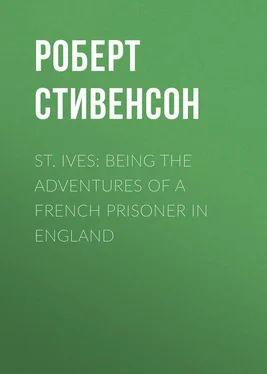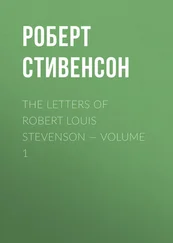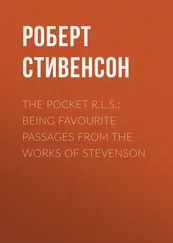Роберт Стивенсон - St. Ives - Being the Adventures of a French Prisoner in England
Здесь есть возможность читать онлайн «Роберт Стивенсон - St. Ives - Being the Adventures of a French Prisoner in England» — ознакомительный отрывок электронной книги совершенно бесплатно, а после прочтения отрывка купить полную версию. В некоторых случаях можно слушать аудио, скачать через торрент в формате fb2 и присутствует краткое содержание. Жанр: literature_19, foreign_antique, foreign_prose, на английском языке. Описание произведения, (предисловие) а так же отзывы посетителей доступны на портале библиотеки ЛибКат.
- Название:St. Ives: Being the Adventures of a French Prisoner in England
- Автор:
- Жанр:
- Год:неизвестен
- ISBN:нет данных
- Рейтинг книги:5 / 5. Голосов: 1
-
Избранное:Добавить в избранное
- Отзывы:
-
Ваша оценка:
- 100
- 1
- 2
- 3
- 4
- 5
St. Ives: Being the Adventures of a French Prisoner in England: краткое содержание, описание и аннотация
Предлагаем к чтению аннотацию, описание, краткое содержание или предисловие (зависит от того, что написал сам автор книги «St. Ives: Being the Adventures of a French Prisoner in England»). Если вы не нашли необходимую информацию о книге — напишите в комментариях, мы постараемся отыскать её.
St. Ives: Being the Adventures of a French Prisoner in England — читать онлайн ознакомительный отрывок
Ниже представлен текст книги, разбитый по страницам. Система сохранения места последней прочитанной страницы, позволяет с удобством читать онлайн бесплатно книгу «St. Ives: Being the Adventures of a French Prisoner in England», без необходимости каждый раз заново искать на чём Вы остановились. Поставьте закладку, и сможете в любой момент перейти на страницу, на которой закончили чтение.
Интервал:
Закладка:
‘You have a mother?’ she asked.
‘In heaven, mademoiselle,’ I answered. ‘She, and my father also, went by the same road to heaven as so many others of the fair and brave: they followed their queen upon the scaffold. So, you see, I am not so much to be pitied in my prison,’ I continued: ‘there are none to wait for me; I am alone in the world. ’Tis a different case, for instance, with yon poor fellow in the cloth cap. His bed is next to mine, and in the night I hear him sobbing to himself. He has a tender character, full of tender and pretty sentiments; and in the dark at night, and sometimes by day when he can get me apart with him, he laments a mother and a sweetheart. Do you know what made him take me for a confidant?’
She parted her lips with a look, but did not speak. The look burned all through me with a sudden vital heat.
‘Because I had once seen, in marching by, the belfry of his village!’ I continued. ‘The circumstance is quaint enough. It seems to bind up into one the whole bundle of those human instincts that make life beautiful, and people and places dear – and from which it would seem I am cut off!’
I rested my chin on my knee and looked before me on the ground. I had been talking until then to hold her; but I was now not sorry she should go: an impression is a thing so delicate to produce and so easy to overthrow! Presently she seemed to make an effort.
‘I will take this toy,’ she said, laid a five-and-sixpenny piece in my hand, and was gone ere I could thank her.
I retired to a place apart near the ramparts and behind a gun. The beauty, the expression of her eyes, the tear that had trembled there, the compassion in her voice, and a kind of wild elegance that consecrated the freedom of her movements, all combined to enslave my imagination and inflame my heart. What had she said? Nothing to signify; but her eyes had met mine, and the fire they had kindled burned inextinguishably in my veins. I loved her; and I did not fear to hope. Twice I had spoken with her; and in both interviews I had been well inspired, I had engaged her sympathies, I had found words that she must remember, that would ring in her ears at night upon her bed. What mattered if I were half shaved and my clothes a caricature? I was still a man, and I had drawn my image on her memory. I was still a man, and, as I trembled to realise, she was still a woman. Many waters cannot quench love; and love, which is the law of the world, was on my side. I closed my eyes, and she sprang up on the background of the darkness, more beautiful than in life. ‘Ah!’ thought I, ‘and you too, my dear, you too must carry away with you a picture, that you are still to behold again and still to embellish. In the darkness of night, in the streets by day, still you are to have my voice and face, whispering, making love for me, encroaching on your shy heart. Shy as your heart is, it is lodged there — I am lodged there; let the hours do their office – let time continue to draw me ever in more lively, ever in more insidious colours.’ And then I had a vision of myself, and burst out laughing.
A likely thing, indeed, that a beggar-man, a private soldier, a prisoner in a yellow travesty, was to awake the interest of this fair girl! I would not despair; but I saw the game must be played fine and close. It must be my policy to hold myself before her, always in a pathetic or pleasing attitude; never to alarm or startle her; to keep my own secret locked in my bosom like a story of disgrace, and let hers (if she could be induced to have one) grow at its own rate; to move just so fast, and not by a hair’s-breadth any faster, than the inclination of her heart. I was the man, and yet I was passive, tied by the foot in prison. I could not go to her; I must cast a spell upon her at each visit, so that she should return to me; and this was a matter of nice management. I had done it the last time – it seemed impossible she should not come again after our interview; and for the next I had speedily ripened a fresh plan. A prisoner, if he has one great disability for a lover, has yet one considerable advantage: there is nothing to distract him, and he can spend all his hours ripening his love and preparing its manifestations. I had been then some days upon a piece of carving, – no less than the emblem of Scotland, the Lion Rampant. This I proceeded to finish with what skill I was possessed of; and when at last I could do no more to it (and, you may be sure, was already regretting I had done so much), added on the base the following dedication. —
I put my heart into the carving of these letters. What was done with so much ardour, it seemed scarce possible that any should behold with indifference; and the initials would at least suggest to her my noble birth. I thought it better to suggest: I felt that mystery was my stock-in-trade; the contrast between my rank and manners, between my speech and my clothing, and the fact that she could only think of me by a combination of letters, must all tend to increase her interest and engage her heart.
This done, there was nothing left for me but to wait and to hope. And there is nothing further from my character: in love and in war, I am all for the forward movement; and these days of waiting made my purgatory. It is a fact that I loved her a great deal better at the end of them, for love comes, like bread, from a perpetual rehandling. And besides, I was fallen into a panic of fear. How, if she came no more, how was I to continue to endure my empty days? how was I to fall back and find my interest in the major’s lessons, the lieutenant’s chess, in a twopenny sale in the market, or a halfpenny addition to the prison fare?
Days went by, and weeks; I had not the courage to calculate, and to-day I have not the courage to remember; but at last she was there. At last I saw her approach me in the company of a boy about her own age, and whom I divined at once to be her brother.
I rose and bowed in silence.
‘This is my brother, Mr. Ronald Gilchrist,’ said she. ‘I have told him of your sufferings. He is so sorry for you!’
‘It is more than I have the right to ask,’ I replied; ‘but among gentlefolk these generous sentiments are natural. If your brother and I were to meet in the field, we should meet like tigers; but when he sees me here disarmed and helpless, he forgets his animosity.’ (At which, as I had ventured to expect, this beardless champion coloured to the ears for pleasure.) ‘Ah, my dear young lady,’ I continued, ‘there are many of your countrymen languishing in my country, even as I do here. I can but hope there is found some French lady to convey to each of them the priceless consolation of her sympathy. You have given me alms; and more than alms – hope; and while you were absent I was not forgetful. Suffer me to be able to tell myself that I have at least tried to make a return; and for the prisoner’s sake deign to accept this trifle.’
So saying, I offered her my lion, which she took, looked at in some embarrassment, and then, catching sight of the dedication, broke out with a cry.
‘Why, how did you know my name?’ she exclaimed.
‘When names are so appropriate, they should be easily guessed,’ said I, bowing. ‘But indeed, there was no magic in the matter. A lady called you by name on the day I found your handkerchief, and I was quick to remark and cherish it.’
‘It is very, very beautiful,’ said she, ‘and I shall be always proud of the inscription. – Come, Ronald, we must be going.’ She bowed to me as a lady bows to her equal, and passed on (I could have sworn) with a heightened colour.
I was overjoyed: my innocent ruse had succeeded; she had taken my gift without a hint of payment, and she would scarce sleep in peace till she had made it up to me. No greenhorn in matters of the heart, I was besides aware that I had now a resident ambassador at the court of my lady. The lion might be ill chiselled; it was mine. My hands had made and held it; my knife – or, to speak more by the mark, my rusty nail – had traced those letters; and simple as the words were, they would keep repeating to her that I was grateful and that I found her fair. The boy had looked like a gawky, and blushed at a compliment; I could see besides that he regarded me with considerable suspicion; yet he made so manly a figure of a lad, that I could not withhold from him my sympathy. And as for the impulse that had made her bring and introduce him, I could not sufficiently admire it. It seemed to me finer than wit, and more tender than a caress. It said (plain as language), ‘I do not and I cannot know you. Here is my brother – you can know him; this is the way to me – follow it.’
Читать дальшеИнтервал:
Закладка:
Похожие книги на «St. Ives: Being the Adventures of a French Prisoner in England»
Представляем Вашему вниманию похожие книги на «St. Ives: Being the Adventures of a French Prisoner in England» списком для выбора. Мы отобрали схожую по названию и смыслу литературу в надежде предоставить читателям больше вариантов отыскать новые, интересные, ещё непрочитанные произведения.
Обсуждение, отзывы о книге «St. Ives: Being the Adventures of a French Prisoner in England» и просто собственные мнения читателей. Оставьте ваши комментарии, напишите, что Вы думаете о произведении, его смысле или главных героях. Укажите что конкретно понравилось, а что нет, и почему Вы так считаете.












